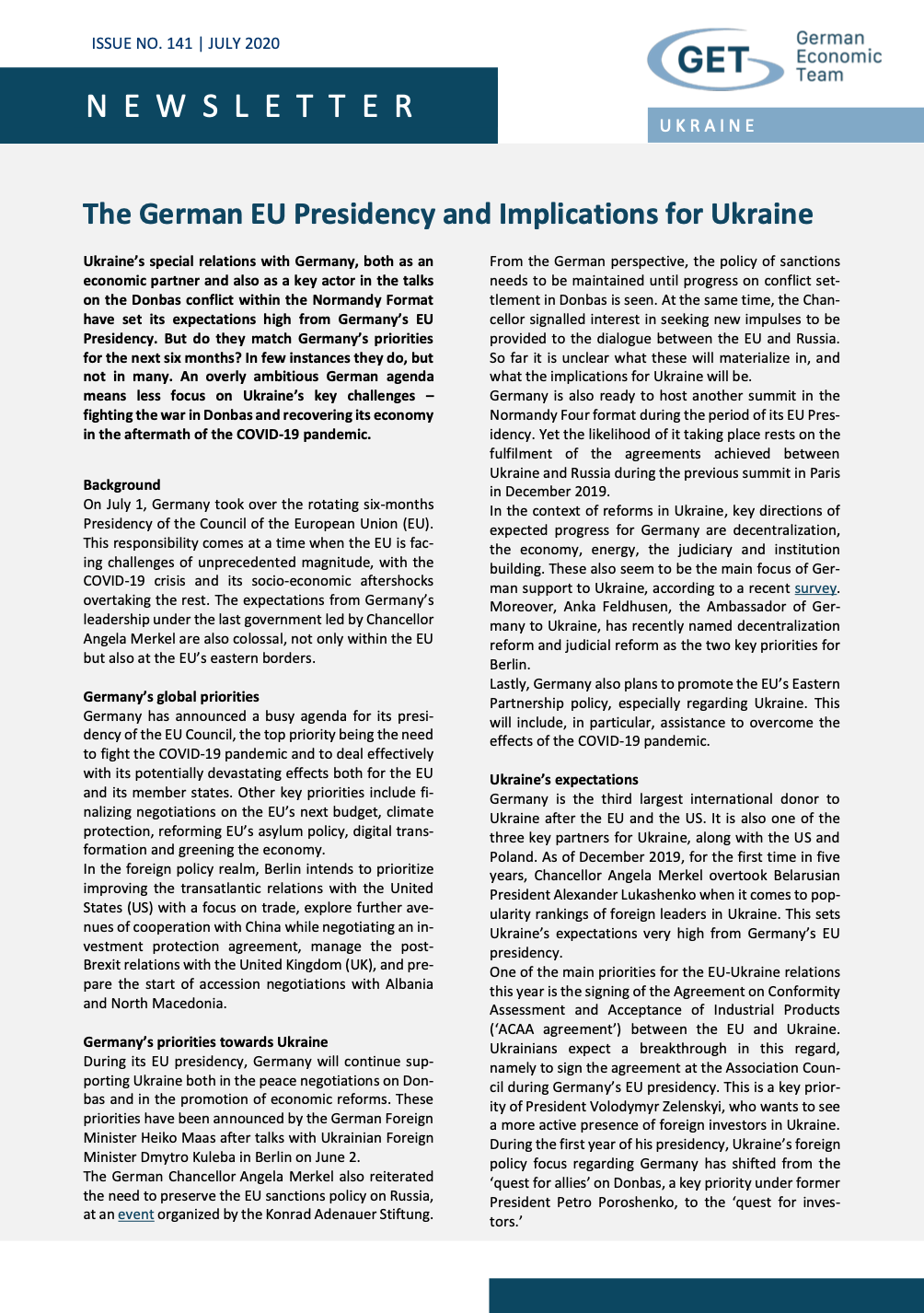Background
On July 1, Germany took over the rotating six-months Presidency of the Council of the European Union (EU). This responsibility comes at a time when the EU is facing challenges of unprecedented magnitude, with the COVID-19 crisis and its socio-economic aftershocks overtaking the rest. The expectations from Germany’s leadership under the last government led by Chancellor Angela Merkel are also colossal, not only within the EU but also at the EU’s eastern borders.
Germany’s global priorities
Germany has announced a busy agenda for its presidency of the EU Council, the top priority being the need to fight the COVID-19 pandemic and to deal effectively with its potentially devastating effects both for the EU and its member states. Other key priorities include finalizing negotiations on the EU’s next budget, climate protection, reforming EU’s asylum policy, digital transformation and greening the economy.
In the foreign policy realm, Berlin intends to prioritize improving the transatlantic relations with the United States (US) with a focus on trade, explore further avenues of cooperation with China while negotiating an investment protection agreement, manage the post-Brexit relations with the United Kingdom (UK), and prepare the start of accession negotiations with Albania and North Macedonia.
Germany’s priorities towards Ukraine
During its EU presidency, Germany will continue supporting Ukraine both in the peace negotiations on Donbas and in the promotion of economic reforms. These priorities have been announced by the German Foreign Minister Heiko Maas after talks with Ukrainian Foreign Minister Dmytro Kuleba in Berlin on June 2.
The German Chancellor Angela Merkel also reiterated the need to preserve the EU sanctions policy on Russia, at an event organized by the Konrad Adenauer Stiftung. From the German perspective, the policy of sanctions needs to be maintained until progress on conflict settlement in Donbas is seen. At the same time, the Chancellor signalled interest in seeking new impulses to be provided to the dialogue between the EU and Russia. So far it is unclear what these will materialize in, and what the implications for Ukraine will be.
Germany is also ready to host another summit in the Normandy Four format during the period of its EU Presidency. Yet the likelihood of it taking place rests on the fulfilment of the agreements achieved between Ukraine and Russia during the previous summit in Paris in December 2019.
In the context of reforms in Ukraine, key directions of expected progress for Germany are decentralization, the economy, energy, the judiciary and institution building. These also seem to be the main focus of German support to Ukraine, according to a recent survey. Moreover, Anka Feldhusen, the Ambassador of Germany to Ukraine, has recently named decentralization reform and judicial reform as the two key priorities for Berlin.
Lastly, Germany also plans to promote the EU’s Eastern Partnership policy, especially regarding Ukraine. This will include, in particular, assistance to overcome the effects of the COVID-19 pandemic.
Ukraine’s expectations
Germany is the third largest international donor to Ukraine after the EU and the US. It is also one of the three key partners for Ukraine, along with the US and Poland. As of December 2019, for the first time in five years, Chancellor Angela Merkel overtook Belarusian President Alexander Lukashenko when it comes to popularity rankings of foreign leaders in Ukraine. This sets Ukraine’s expectations very high from Germany’s EU presidency.
One of the main priorities for the EU-Ukraine relations this year is the signing of the Agreement on Conformity Assessment and Acceptance of Industrial Products (‘ACAA agreement’) between the EU and Ukraine. Ukrainians expect a breakthrough in this regard, namely to sign the agreement at the Association Council during Germany’s EU presidency. This is a key priority of President VolodymyrZelenskyi, who wants to see a more active presence of foreign investors in Ukraine. During the first year of his presidency, Ukraine’s foreign policy focus regarding Germany has shifted from the ‘quest for allies’ on Donbas, a key priority under former President Petro Poroshenko, to the ‘quest for investors.’
Yet, despite this business focus, most of the high-level dialogue with Germany is focused on Donbas-related issues. Ukrainian authorities have particularly high expectations regarding Germany in the context of resolving the conflict in Donbas. Those expectations relate mainly to supporting several of Ukraine’s key positions in the negotiations process with Russia. Kyiv hopes that Berlin will contribute towards (i) defending the position regarding the Minsk Format’s flexibility with a key point for Ukraine being securing the border control with a foreign component before elections; (ii) providing access for humanitarian organizations (Red Cross) to the occupied territories, an agreement that was reached at the Normandy Format summit in Paris but never implemented; and (iii) putting pressure on Moscow in terms of facilitating the exchange of prisoners. Kyiv also hopes that Germany, during its EU Council's presidency, will give a clear signal about Ukraine's European future.
Conclusion and outlook
Germany has set for itself a very ambitious agenda for its Presidency of the EU Council. Expectations are high both within and outside the EU in terms of what the EU can achieve under German leadership. Comparing Berlin’s priorities for its EU Presidency and Kyiv’s expectations from Germany in the next six months, there are matching points, but not too many.
Ukraine is a priority partner for the EU. From a German perspective, the 22nd EU-Ukraine Summit which will take place on October 1 is an important opportunity to reaffirm the strong political and economic ties between the EU and Ukraine. Due to the pandemic and its consequences as well as reticence among several EU member states, the talks around the ACAA agreement are unlikely to be at a stage where the signing of the agreement would be feasible. It is more likely that the highlight of the summit would be the signing of a common aviation area agreement, which was previously blocked due to the UK-Spain conflict over the status of the Gibraltar airport.
Among the unprecedented challenges that Europe faces, Ukraine’s woes do not make it to the list of top priorities. While Germany is ready to uphold Europe’s support for the sanctions against Russia, and to host another summit in the Normandy Four format should progress on previous commitments be recorded, it is also interested in finding more avenues for selective engagement with Russia. This might soften the EU’s language of power towards Russia, something that would play against Ukraine’s interests and bargaining power in future negotiations over the Donbas conflict settlement.


